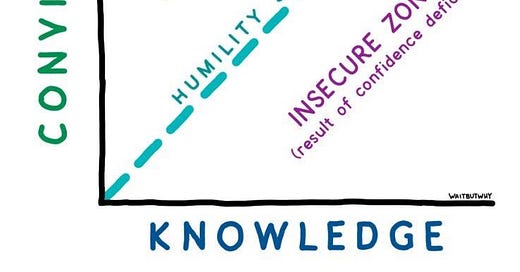Arrogance = ignorance + conviction as per blogger Tim Urban. Please see the chart below:
But here is something to consider:
Individually, we lean towards the comfort of conviction because it is good for our self-esteem. Having doubts is discomforting. We take pride in our knowledge, and we want to stay true to our beliefs. Many people believe that speaking with passion and conviction is necessary for persuasion.
Visa founder, Dee Hock says “We are built with an almost infinite capacity to believe things because the beliefs are advantageous for us to hold, rather than because they are even remotely related to the truth.”
Collectively, we celebrate confident people. Groups prefer the most assertive person in the room. We reward confidence over competence. The most confident speaker claims the most status. Great leaders who are strong-minded and clear-sighted are the epitomes of conviction.
The problem with the above is that one can get trapped in a cycle of overconfidence, where pride in our knowledge (which may be false) sustains strong belief. Further, the influences of confirmation and desirability biases contribute to its validation.
The danger of conviction is that it can stifle critical thinking. Instead of exploring for new ideas we may fall victim to the – “attack and defend strategy”. We may stop asking questions.
Shouldn’t we adopt the middle path of humility wherein we know what we know but are open to changing our minds in the light of new information.
In a rapidly changing world, having fixed ideas can quickly lead to decline. Evidence reveals that the best thinkers are slow and unsure. They think like scientists and favors humility over pride. They have mental liquidity.
Per Morgan Housel, “Mental liquidity is the ability to quickly abandon previous beliefs when the world changes or when you come across new information”.
How can we have the right level of conviction, while being open to alternative views? Confident humility is perhaps the answer.




Very well put!